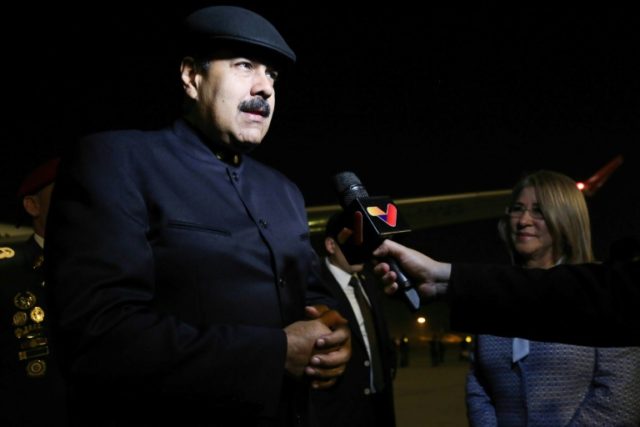Five prominent Latin American democracies will ask the International Criminal Court (ICC) on Tuesday to investigate Nicolás Maduro’s socialist regime in Venezuela on charges of crimes against humanity.
The Financial Times reports that Argentina, Colombia, Chile, Peru, and Paraguay will send a joint letter to the ICC demanding an investigation into the country’s egregious human rights record that includes over 8,000 extrajudicial executions as well as the repression and imprisonment of hundreds of opposition activists.
In addition to human rights violations, the Maduro regime is directly responsible for the worst economic and humanitarian crisis in Venezuelan history. Thousands of people have fled the country in search of survival resources such as food, medicine, and sanitary products. The exodus has now become a full-scale migration crisis placing severe pressure on receiving countries such as Colombia and Brazil.
The move to refer the regime to the ICC will intensify the growing international pressure on the regime as growing numbers of regional leaders and Venezuelan exiles open to the possibility of a military intervention designed to oust the Maduro regime.
“Never before has a country been referred to the ICC by an outside state,” one diplomat told the Times. “This is a huge step. It’s historic.”
Typically, states use the International Court of Justice (ICJ) to brings charges against other states. The ICJ only has jurisdiction in situations where both parties to a complain are sovereign nations. The Venezuela case is different in that, while those petitioning for litigation are countries, they are demanding a criminal investigation into the individuals running Venezuela, not bringing the state of Venezuela to court.
On Tuesday, the United States announced fresh sanctions on Maduro’s inner circle, including his wife Celia Flores and vice president Delcy Rodriguez, seizing all their U.S.-based assets and barring Americans from dealing with them in any business capacity.
“We are continuing to designate loyalists who enable Maduro to solidify his hold on the military and the government while the Venezuelan people suffer,” said Treasury Secretary Steven Mnuchin. “Treasury will continue to impose a financial toll on those responsible for Venezuela’s tragic decline, and the networks and front-men they use to mask their illicit wealth.”
Last week, both Colombia and Canada refused to sign a document ruling out a military solution to the crisis, while Sen. Marco Rubio (R-FL) warned there is a “very strong argument” for an intervention on the grounds of protecting U.S. national security. President Donald Trump has also mulled over the possibility, although his idea was reportedly rejected by regional leaders after proposing it in September last year.
Peruvian President Martin Vizcarra told Reuters on Tuesday that he would oppose any use of military force, despite the huge influx of Venezuelan migrants entering Peru in recent months.
“As a country, we must be clear to say we reject a warlike, military solution,” Vizcarra said.“What we need to do is find a way to sanction the regime without affecting the population.”
Follow Ben Kew on Facebook, Twitter at @ben_kew, or email him at bkew@breitbart.com.

COMMENTS
Please let us know if you're having issues with commenting.